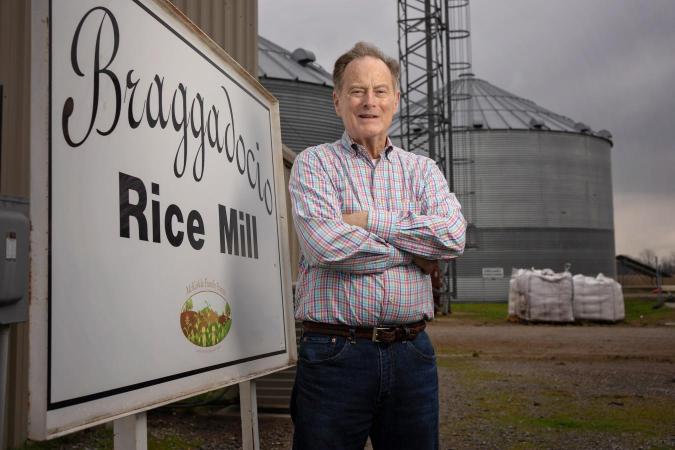Meet the Farmers
McKaskle Family Farm is a 3,700-acre grain farm and rice mill operated by the 5th-, 6th-, and 7th-generations of the McKaskle family in Braggadocio, Missouri. They have been at the forefront of Organic, regenerative, climate-friendly farming since the 1990s. Today, through their Braggadocio Rice Mill they process Climate-Friendly rice for distribution to top U.S. restaurants and retailers.
Steve McKaskle had just finished up earning his law degree in 1973 from the University of Mississippi when his newly-minted father-in-law, Joe Bob Coppage, asked him to, “Come home and farm.” Steve, and his wife Kaye, agreed.
“I couldn’t have been greener,” McKaskle said in an interview with AgWeb. “My father-in-law, who I loved dearly, talked us into coming back because there were no young people returning home to farm. I was 21 with no experience and 300 acres to work.”
Since that time the story of the farm has been one of innovation and endurance. Seeing opportunities to pursue his desire to farm in-sync with nature while earning a premium for crops, Steve pushed into large-scale Organic crops in the ‘90s and produced Organic cotton for Patagonia, Nike, and Levi’s.
Following the success of their expansion into cotton, Steve and the family started to experiment with Organic rice production. Then Organic popcorn. Once operations were settled, Steve himself took to the pavement to knock on doors and shake hands of shop owners to get their product on the shelves.
In 2016, McKaskle Family Farm opened the doors on their rice processing plant, the Braggadocio Rice Mill.
Surviving devastating tornadoes, crop loss to fire, and even cancer, Steve and the McKaskle family have proven time and again their commitment to their farm, the regeneration of the land, and to each other. We salute their efforts and are proud to support Steve and the McKaskle family.
Regenerative & Sustainable Practices
McKaskle’s “Climate-Friendly” system is designed to enhance soil health, promote biodiversity, maintain a healthy water cycle, and capture atmospheric carbon in the soil. Presently, the practices they’re using include:
Working with Soil & Climate Initiative and Soil Regen to develop and implement production plans;
Minimizing soil disturbance through no-tilling all soybeans and wheat fields and minimizing tillage using a vertical tiller for all rice fields;
Maintaining conservation buffers of tree lines, hedgerows and pollinators to reduce wind erosion and create wildlife and pollinator habitat;
Working to maximize diversity on the farm by maintaining an expanded crop rotation of rice, soy, corn and wheat (recently added) to help with nutrient cycling and prevent disease and pests;
Utilizing furrow irrigation rather than flood irrigation for over 80% of rice fields which uses much less water and allows there to be living roots in the ground longer;
Keeping year-round soil coverage by leaving rice straw residue in the field to cover fields, retain moisture, and create a beneficial habitat for bugs and microbes;
Avoiding the use of all insecticides and fungicides to support soil microbiome health;
Reducing synthetic nitrogen by ensuring application methods maximize uptake of nitrogen into the crop and reduce runoff;
Actively working toward continuous learning and improvement through involvement with other area regenerative farmer mentors, comprehensive soil testing across the farm, and attending monthly meetings with the Soil & Climate Initiative group;
Maintenance of Organic Certification on the rice and popcorn processing facility in order to offer Organic products purchased from growers that have been able to maintain their Organic certification;
McKaskle Family Farm provides stable employment in the poorest county in Missouri and provides a living wage, overtime, and health insurance.
Producing rice in a way that is beneficial to the climate is no easy task. The most-commonly used method involves widespread flooding of fields coupled with heavy soil tillage. This approach has been shown to release large amounts of methane and carbon dioxide into the atmosphere and degrade soil condition.
As the McKaskles are dedicated stewards of the land, after they lost their organic certification due to Dicamba drift issues, they still wanted to find a way to produce rice in an ecologically minded manner. Therefore, Steven and his family helped develop “Climate-Friendly” rice production, which avoids flooding and heavy tillage, and reducing the high emissions that are standard in conventional rice production.
To advance the mission of developing regenerative rice production methods, the McKaskles have teamed up with the Soil & Climate Initiative (SCI) and Soil Regen to build a farm regeneration plan that will build soil health, cycle water, and keep greenhouse gases stored safely underground.
This plan eliminates the negative outcomes produced by flooding and tillage, but unfortunately, flooding and tillage were effective means of chemical-free weed control. Without those tools, weeds invade recovering soil and degrade crop quality.
It was determined by SCI, Soil Regen, and the McKaskles that by judiciously using herbicide in places, the McKaskle Family Farm could control weeds while quickly building soil structure and soil health. Once the soil recovers enough health, it will produce plants strong enough to fight off pests and weeds themselves—allowing the McKaskles to use an ever-decreasing amount of herbicide. In this instance, using the herbicide judiciously, when and where it is needed, actually regenerates the ecology of the land faster than the widespread non-chemical methods of rice production.
The McKaskles have been dedicated stewards of the land for generations. Their goals are, and have been, to regenerate the land, to produce nutritious food, and to keep farming. We appreciate the complexity of the environments and challenges of working within complex ecosystems. The McKaskle family is working with regeneration experts, making tough decisions, and humbly pushing forward in an effort to clean up and regenerate the land.

